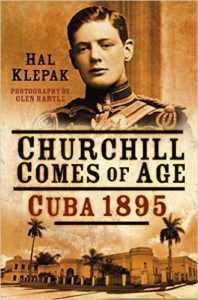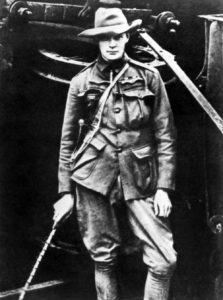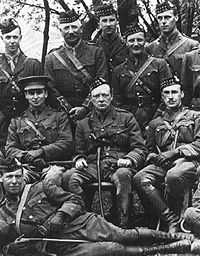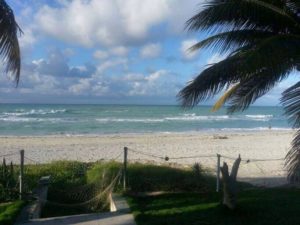One of the most curious events in the Spanish-Cuban-American war was the presence of Winston Churchill (1895) much before the U.S. entry into the war. Churchill was gathering information as a military observer. There are even some who infer that the information on tactics and methods used by the Spanish was put to work in subsequent Boer War, and led to the eventual victory of the British forces in that South African War.
It is interesting to speculate that a much more complete military style copy of Churchill’s reports may exist somewhere in the vast archives of the British Empire, or in the private papers of his son Randolph. In support of this, one can infer tantalizing hints by Randolph, when he refers to his father Winston Churchill’s advice to him at the time of the Spanish Civil War so as not to appear to be a spy. In addition, it is noted below Winston Churchill at the time of his visit to Cuba was on a leave of absence from his regiment.
What we see below are accounts by a brilliant, but still very young, man who just turning twenty-one as yet does not fully understand the complexities of irregular war, nor the subtleties of Cuban politics and racial relations. For instance Churchill accepts the Spanish propaganda point that Antonio Maceo was a Black separatist, a while it is now clear that Maceo, not only was not completely black (he was mulatto), but was an avowed integrationist. The Spanish (e.g. Antonio Serra Ortiz, 1906) view of the war was of course quite different from the Cuban perspective (Jose Miro Argenter 1909). Whatever, South Africa, the Sudan, Gallapoli etc, will teach Churchill other lessons, and a great man will be forged.
On Dec. 6, 1895, The Times reported that Churchill was one of two British lieutenants with Spanish forces battling Cuban revolutionaries seeking independence. He had official cover as a military observer, but was really moonlighting as a war correspondent for The Daily Graphic. Churchill ended up making news himself — after coming under fire several times, he was commended for “valorous conduct”:
EL JOVEN MILITAR BRITANICO WINSTON CHURCHILL EN CUBA.
Uno de los más curiosos acontecimientos en la guerra española – cubano-americana fue la presencia de Winston Churchill (1895 ) mucho antes de la entrada de EE.UU. en la guerra. Churchill estaba reuniendo información como observador militar . Incluso hay algunos que inferir que la información sobre las tácticas y los métodos utilizados por los españoles se puso a trabajar en la posterior Guerra de los Boers , y llevó a la victoria final de las fuerzas británicas en esa guerra de Sudáfrica .
Es interesante especular que una copia mucho más completo al estilo militar de los informes de Churchill puede existir en algún lugar de los vastos archivos del Imperio Británico , o en los documentos privados de su hijo Randolph. En apoyo de esto, uno puede inferir pistas tentadoras por Randolph, cuando se refiere a su padre el consejo de Winston Churchill a él en el momento de la Guerra Civil española , para no dar la impresión de ser un espía . Además , se señala a continuación Winston Churchill en el momento de su visita a Cuba fue en una licencia para ausentarse de su regimiento .
Lo que vemos a continuación son las cuentas por un brillante , pero aún muy joven, hombre que acaba de cumplir los veintiún años todavía no entiende completamente las complejidades de la guerra irregular , ni las sutilezas de la política cubana y las relaciones raciales. Por ejemplo Churchill acepta el punto de propaganda española que Antonio Maceo era un separatista Negro , desde hace tiempo , ahora es evidente que Maceo , no sólo no era completamente negro (él era mulato ), pero fue un integracionista declarado. El punto de vista español (por ejemplo, Antonio Serra Ortiz , 1906) de la guerra fue , por supuesto, muy diferente de la perspectiva cubana ( José Miró Argenter 1909). Lo que sea, Sudáfrica , el Sudán, Gallapoli etc, enseñarán Churchill otras lecciones , y un gran hombre se forjó .
El 6 de diciembre de 1895, The Times informó que Churchill era uno de los dos tenientes británicos con fuerzas españolas luchando contra los revolucionarios cubanos que buscaban la independencia. Tenía cobertura oficial como observador militar, pero en realidad trabajaba como corresponsal de guerra en The Daily Graphic. Churchill terminó haciendo las noticias él mismo – después de ser atacado varias veces, él fue elogiado por “conducta valiosa”:
Agencies/Daley/New York TImes/Internet Photos/Arnoldo Varona/TheCubanHistory.com
THE CUBAN HISTORY, HOLLYWOOD.



 THE YOUNG British Military Winston Churchill in Cuba. + EL JOVEN Militar Britanico Winston Churchill in Cuba.
THE YOUNG British Military Winston Churchill in Cuba. + EL JOVEN Militar Britanico Winston Churchill in Cuba.





